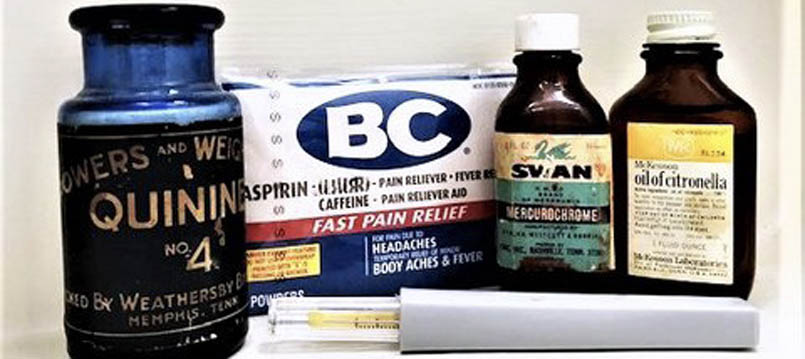24 Sep 2019 ‘Sore throats and sassafras tea’
In other days it was the norm to do home doctoring when someone was ailing or a baby was due. In my family of five siblings, the last two births were the first born in medical facilities. The first three were born at home, not always aided by doctors who arrived from miles away. My oldest brother was born at a neighbor’s house as our parents did not yet have their own. The next one was delivered on the dining table by a doctor who was not a practicing teetotaler.
This brother says, “He never turned in my birth to the authorities, so I never had a birth certificate. The birth was entered into the family Bible, but it was destroyed when the house burned. When I applied for Social Security, I had to go through paperwork just to prove I was born.”
The third brother was born on the same table, a breech delivery of 10-pounds and possibly weighed on cotton scales. The doctor was unable to attend, as his son had borrowed his car. The duty fell to my dad, who in his time as a sometime veterinarian had delivered other “newborns.”
Annual childhood health events for me were sore throats and bronchitis. I felt bad, but became worse when I saw the little bottle of red iodine and the long throat swab heading for my open mouth. Then came the blue glass jar of Vick’s salve. It was rubbed on the chest and under the nose followed by gargling with salt water.
Sometime in the third grade I acquired a case of “epidemic parotitis” or “mumps.” We do not have a single “mump” in our bodies, much less two or more. However, the term originated in 1592 and sounds as good as any. It is actually a viral swelling of one or more parotid (salivary) glands. When you feel that bad, you don’t care what it is; you just want over it. It is bad enough on a kid, but when your 48-year-old father catches it from you, you feel worse. He was actually sicker than I, so I slept in the hall on an old Army cot while he got a nice bed because he groaned louder.
Some medicines were thought very harmless when I was a child, as was one called paregoric used for digestive tract ailments, coughs and pain. It has a checkered past as its principal ingredient was powdered opium. While I do not recall it in our home, I do recall later products that took its place in “digestive disturbances,” a mixture of Kaolin (clay) and pectin (thickener).
I am fortunate to have had parents who used or remembered the use of ancient remedies. One of those was sassafras tea. Its use was taught to the American colonists by the Native Americans. As a matter of fact, English expeditions would arrive in America in the 1600s to gather up bundles of sassafras, as it was valuable in England. Our local supply of sassafras has likely suffered the last 30 years through the onslaught of housing developments, as it would just be another bush in the way of the heavy machinery.
In ancient days and not so ancient, it was a delicious tea that was for “thinning one’s blood” after staying inside all winter. I have seen sassafras in the past on Faulkner County roadsides, but not much anymore. My dad gathered it in late fall or winter as it is then easier to identify without foliage. Mother brewed it and we eventually regretted drinking the last drop. I recently purchased some in concentrate form, bottled in Ohio. It says, “North America’s Original Tea,” so I knew they knew their history.
I was cleaning out a fence row once and removed what appeared to be a type of elm tree sapling. It had flat-sided, somewhat flexible projections along two opposite sides of the stems. Thinking it had some disease, I asked my dad about it and he identified it as a “Winged Elm,” a common elm found throughout the South and presumably all over Arkansas. He said it was used as a toothbrush in his youth. It was easy to see why, and dipped in a bit of baking soda, I guess it did the trick!
I have learned a few trivial matters about things medical. For one, don’t ask someone if their sick friend has a temperature. If they say “no,” don’t call the doctor; call the coroner. Now if you ask if they have a fever and they say “no,” that’s better. I also learned that the oath that doctors take does not instruct to “First, do no harm.” Hippocrates did sort of say that in his ramblings, but not in an oath.
Now, if I could just figure out why we get sick or hurt at night or on weekends or holidays …

- They found their ‘true grit’ - January 5, 2026
- And that’s what Christmas is really all about - December 2, 2025
- Giving thanks - November 4, 2025









